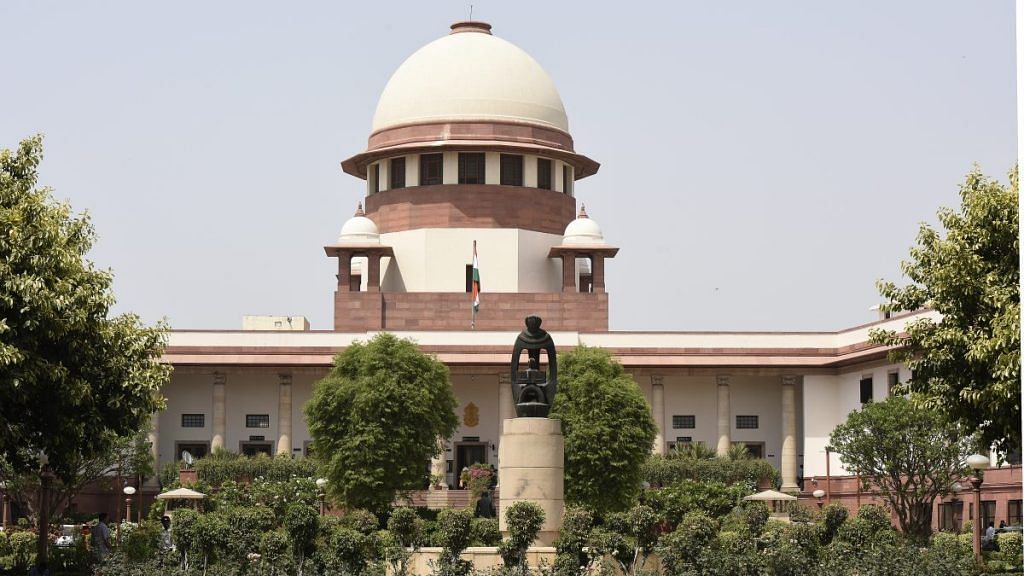New Delhi: The Supreme Court Friday directed all political parties to present in a sealed cover, by 30 May, all the details on donations they have received through electoral bonds.
Issuing the directive, the court said the matter will be argued in detail later, which means the scheme stays in place as of now. The interim ruling came a day after the Lok Sabha election kicked off.
The court said electoral bonds were a “weighty issue… that requires in-depth hearing” as they had a “tremendous bearing on the sanctity of the election process”. The court had to ensure that the interim measures implemented did not tilt the balance in favour of any political party, the three-judge bench headed by CJI Ranjan Gogoi added.
The Supreme Court also directed the modification of a Finance Ministry notification allowing five extra days for the purchase of electoral bonds this April and May, saying the extra days should be deleted from the sale schedule.
The apex court had Thursday reserved its order on a batch of pleas that challenged the validity of the electoral bond scheme, introduced by the Narendra Modi government last year.
The pleas, filed by the Communist Party of India (Marxist), along with NGOs Common Cause and the Association for Democratic Reforms (ADR), seek either a stay on electoral bonds or the identification of purchasers, who stay anonymous under current rules.
The scheme was challenged on the grounds that it was “an obscure funding system which is unchecked by any authority.”
Electoral bonds are bearer instruments available at State Bank of India branches that range in value from Rs 1,000 to Rs 1 crore. Those looking to fund a party can buy an electoral bond of their chosen value and hand it to the desired recipient, who can then get it encashed.
While the bank at the buyer’s end won’t know the party the bond is meant for, the one at the cashing-in end would not know the identity of the buyer.
The government has argued that since the bank would follow KYC [know-your-customer] procedures while issuing the bonds, it would ensure that only white money is used to fund parties, thus choking the hold of black money on political funding.
However, critics insist that the anonymity afforded to donors could allow the use of money power by corporates to influence government policy.
Another controversial provision of the scheme allows Indian subsidiaries of foreign companies to donate money to parties — a rule brought by the Modi government — which has stoked fears that the anonymous electoral bonds may be used by foreign players to affect domestic policy.
In its plea, the ADR pointed out that 95 per cent of the electoral bonds purchased had been encashed by the ruling BJP. It added that most of the bonds bought had been in the denominations of Rs 10 lakh and Rs 1 crore, which suggests that the scheme was not being availed of by the common man .
The Election Commission, too, has opposed the anonymous nature of the bonds.
Also read: Electoral bonds help BJP coerce donors & that’s why Arun Jaitley rises to their defence
What the Centre said
Responding to the concerns, the Centre submitted that electoral bonds would bring in more transparency to the funding of political parties.
However, one of the judges on the Supreme Court bench, Justice Deepak Gupta, pointed out: “You are talking of the right of the donor to secrecy. But the right of the voter to have transparency is an important part of democracy!”
To this, Attorney General K.K. Venugopal, who was representing the Centre, suggested that donors had a right to privacy, but voters did not have a right to know where their political party gets funding from.
When the bench asked the Centre, “Why do you want to keep the identity (of the purchaser of the bonds) a secret?”, Venugopal replied: “All industrialists have to knock on the doors of the government from time to time for licences, exemptions etc. If it is known that they gave 50 crores or 100 crores to one party, they would be targeted by the rival parties.”
The AG stressed that the electoral bond scheme was an experiment to stem the flow of black money. However, when the bench quizzed the Centre on how the electoral bonds would curb black money, the AG stressed that the scheme was simply an experiment and it could not be worse than the system in place.
“They (political parties) distribute bottles of liquor, biryani etc. at rallies. Every single method of wooing the voters is employed, mostly legal means but some even illegal…that is the way of life…” he said.
“The biggest fraud is perpetrated in the returns filed for election expenses. What is 20-30 crores for each constituency as is revealed to the ECI under 77 (section 77 of the RPA, 1951)?” the AG replied.
Also read: Arun Jaitley defends electoral bonds, says they check black money
This report has been updated with additional information
